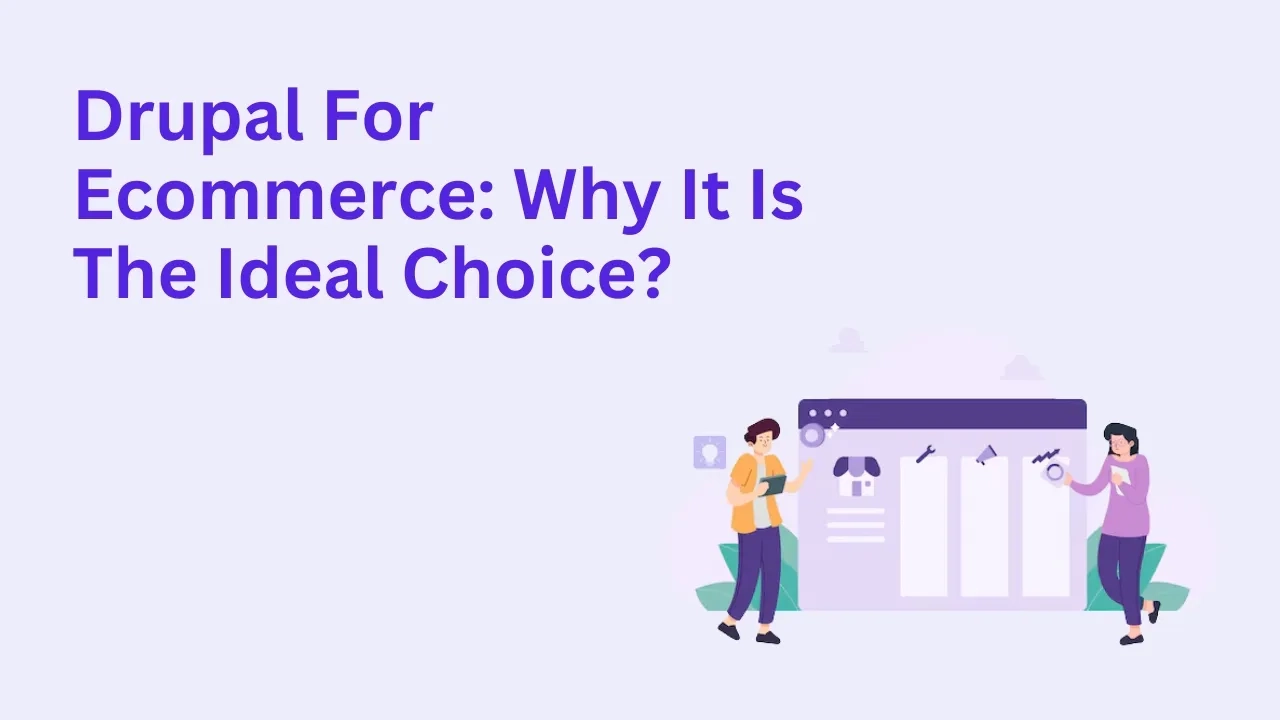Drupal For Ecommerce: Why It Is The Ideal Choice?

Drupal For Ecommerce: Why It Is The Ideal Choice?
In today’s competitive digital landscape, choosing the right platform for your ecommerce website is crucial. Drupal, a powerful Content Management System (CMS), has emerged as a favorite for businesses aiming to create scalable, secure, and customizable online stores. This blog explores why Drupal is the ideal choice for ecommerce in 2025.
Understanding the Importance of Choosing the Right Ecommerce Platform
An ecommerce platform serves as the backbone of your online store. The right platform can:
- Streamline operations.
- Enhance customer experience.
- Support business growth and scalability.
Drupal’s robust architecture and flexibility make it a strong contender in the ecommerce space.
Why Drupal Stands Out for Ecommerce
Drupal offers unique features tailored for ecommerce, such as:
- Advanced customization options.
- Seamless third-party integrations.
- Exceptional performance and scalability.
Explore Drupal’s features.
Also read: WordPress Vs Drupal: How To Choose The Right CMS In 2025?
Scalability: Meeting the Needs of Growing Businesses
Ecommerce businesses need a platform that scales as they grow. Drupal excels with:
- Multisite capabilities for managing multiple stores.
- Support for high-traffic websites.
- Flexible architecture for adding new features.
Robust Security for Ecommerce Websites
Security is critical for ecommerce websites dealing with sensitive customer data. Drupal offers:
- Regular security updates.
- Enterprise-grade security protocols.
- Active community vigilance to address vulnerabilities.
Customization and Flexibility in Drupal Ecommerce
Every business has unique needs, and Drupal’s customization options include:
- Tailored user experiences.
- Custom modules and themes.
- Advanced workflows to match your business operations.
Discover more about Drupal customization.
Also read: 15 Pain Points That Are Fixed by Drupal Development
Seamless Integration with Third-Party Tools
Ecommerce websites often rely on third-party tools for payments, shipping, and marketing. Drupal provides:
- API-first architecture for easy integrations.
- Support for payment gateways like PayPal and Stripe.
- CRM and ERP integration for enhanced business management.
Enhanced User Experiences with Personalization
Personalization drives conversions. Drupal helps businesses create personalized shopping experiences by:
- Tracking user behavior.
- Displaying relevant product recommendations.
- Offering localized content and promotions.
Performance and Speed: Key Factors for Ecommerce Success
A slow website can lead to lost sales. Drupal ensures optimal performance with:
- Caching mechanisms for faster page loads.
- Efficient database management.
- Optimized code for speed.
Also read: Why Drupal for Travel Websites Would Be a Game Changer?
Multilingual Capabilities for Global Reach
Expanding to international markets requires a platform with robust multilingual support. Drupal offers:
- Built-in translation tools.
- Support for multiple currencies and tax systems.
- Localization options for global audiences.
Drupal Commerce: A Dedicated Solution for Online Stores
Drupal Commerce, a powerful extension of Drupal, provides:
- Comprehensive ecommerce functionalities.
- Flexible product management.
- Advanced checkout and payment features.
Learn more about Drupal Commerce.
SEO Capabilities: Driving Traffic to Your Online Store
Search Engine Optimization (SEO) is essential for ecommerce success. Drupal’s SEO features include:
- Clean URLs and meta tags.
- XML sitemap generation.
- Integration with analytics tools.
How Drupal Ensures Mobile-Responsive Ecommerce Websites
With mobile commerce on the rise, Drupal helps businesses cater to mobile users by offering:
- Responsive design frameworks.
- Mobile-first themes.
- Optimized performance for mobile devices.
Also read: Why Is Drupal The Best Choice For Healthcare Business?
Comparing Drupal with Other Ecommerce Platforms
While platforms like Shopify and Magento are popular, Drupal offers distinct advantages:
- Greater customization than Shopify.
- Easier scalability compared to Magento.
- No licensing fees, unlike many proprietary platforms.
Community Support: A Key Advantage of Drupal
Drupal’s active community ensures continuous improvement and support. Benefits include:
- Access to thousands of free modules and themes.
- Regular updates and patches.
- Forums and documentation for troubleshooting.
Is Drupal Right for Your Ecommerce Business?
Ask yourself:
- Do you need a highly customizable platform?
- Are security and scalability priorities for your business?
- Do you require multilingual and multi-currency support?
If you answered yes, Drupal could be the perfect choice for your ecommerce needs.
Conclusion
Drupal’s flexibility, scalability, and robust features make it an ideal choice for ecommerce businesses in 2025. Whether you’re a small startup or a large enterprise, Drupal provides the tools needed to succeed in a competitive market. Ready to build your ecommerce store with Drupal? Get in touch with Drupalify today!








